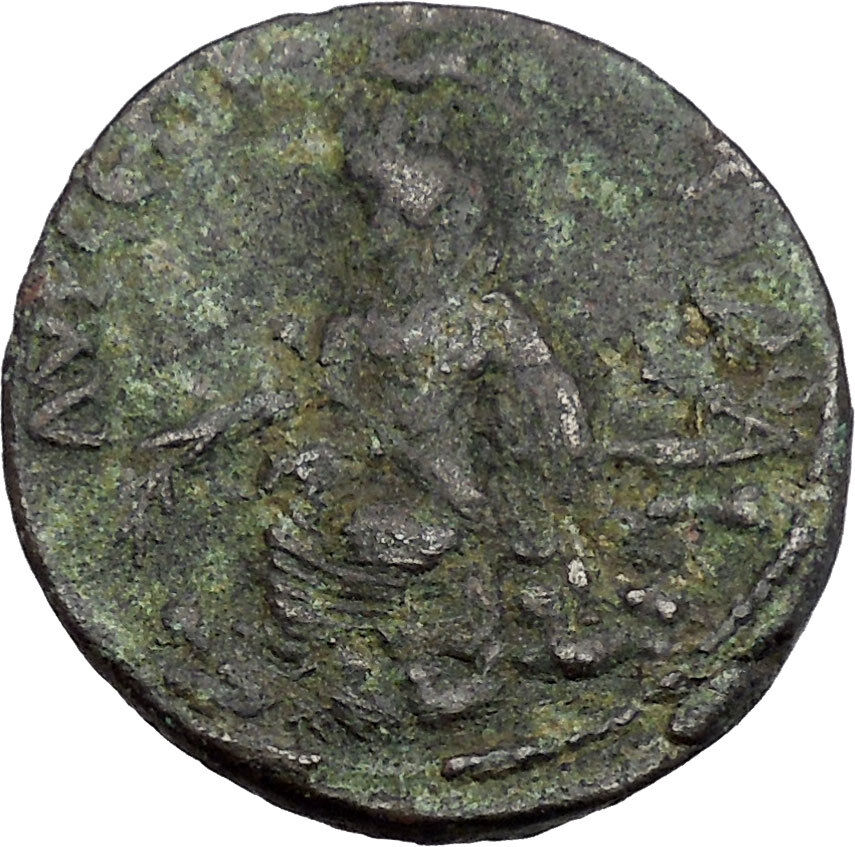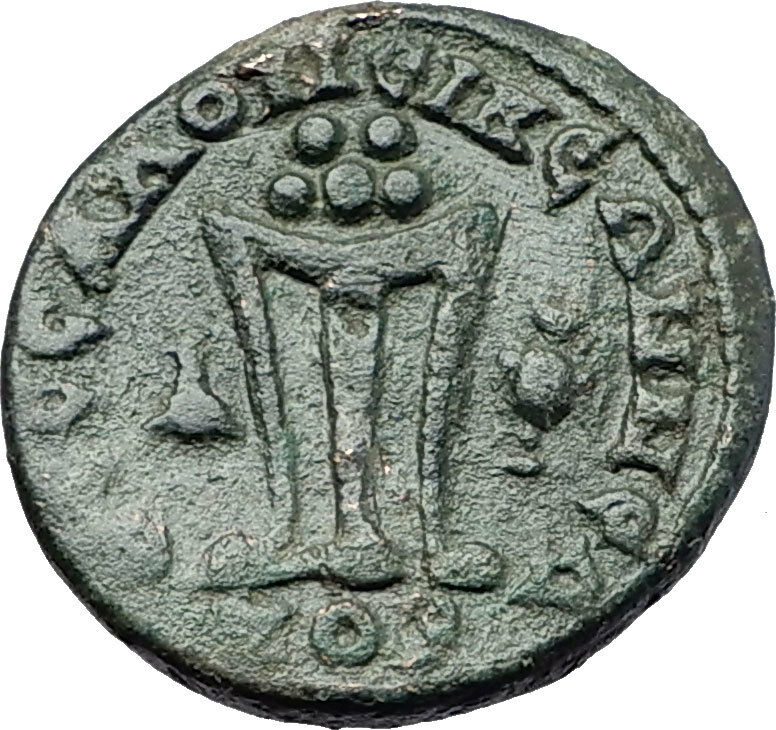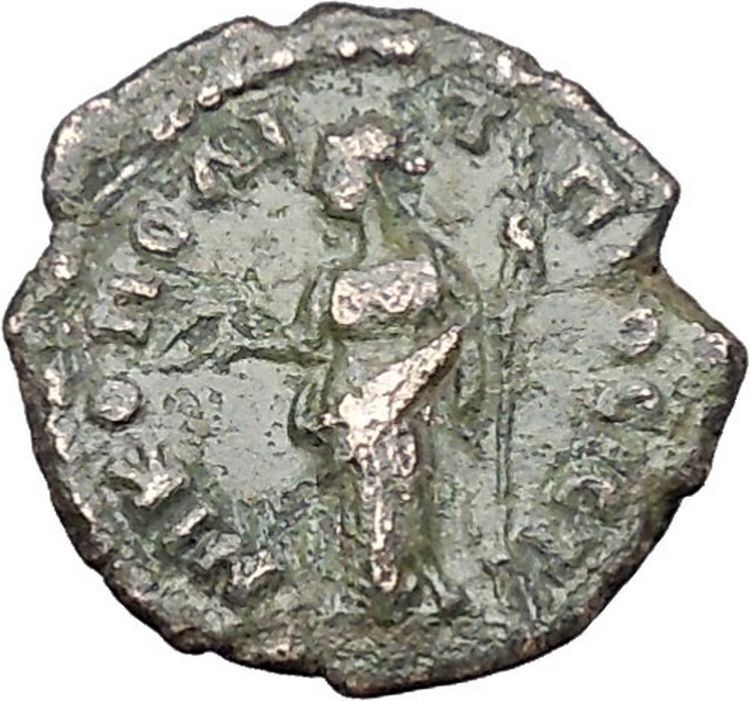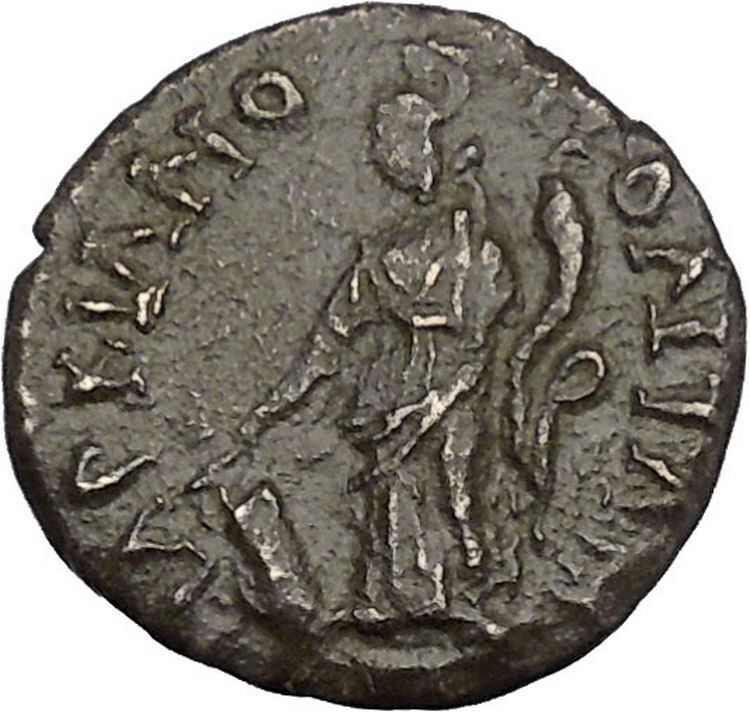|
Septimius Severus – Roman Emperor: 193-211 A.D. –
Bronze 17mm (3.69 grams) of Nicopolis ad Istrum in Moesia Inferior
AV KAI CЄ CЄVHPOC, laureate
head right.
NIKOΠOΛIT ΠPOC ICTPO, Nude Hercules standing right, holding apple from his 11th
Labor of stealing some golden apples of immortality from the Hesperides and
club.
You are bidding on the exact item pictured,
provided with a Certificate of Authenticity and Lifetime Guarantee of
Authenticity.
The Eleventh
Labour of Heracles
After Heracles completed his first ten
Labours
,
Eurystheus
gave him two more claiming that
neither the Hydra counted (because
Iolaus
helped Heracles) nor the Augean stables
(either because he received payment for the job or because the rivers did the
work). The first of these two additional Labours was to steal the apples from
the garden of the Hesperides. Heracles first caught the
Old Man of the Sea
, the shape-shifting sea god,
to learn where the Garden of the Hesperides was located.
In some variations, Heracles, either at the start or at the end of his task,
meets Antaeus
, who was invincible as long as he
touched his mother,
Gaia
, the earth. Heracles killed Antaeus by
holding him aloft and crushing him in a bearhug.
Herodotus
claims that Heracles stopped in
Egypt
, where
King Busiris
decided to make him the yearly
sacrifice, but Heracles burst out of his chains.

Hercules stealing the golden apples from the Garden of the
Hesperides. Detail of a
Twelve Labours
Roman mosaic
from Llíria
,
Spain
(3rd century).
Finally making his way to the Garden of the Hesperides, Heracles tricked
Atlas
into retrieving some of the golden apples
for him, by offering to hold up the heavens for a little while (Atlas was able
to take them as, in this version, he was the father or otherwise related to the
Hesperides). This would have made this task – like the Hydra and Augean stables
– void because he had received help. Upon his return, Atlas decided that he did
not want to take the heavens back, and instead offered to deliver the apples
himself, but Heracles tricked him again by agreeing to take his place on
condition that Atlas relieve him temporarily so that Heracles could make his
cloak more comfortable. Atlas agreed, but Heracles reneged and walked away,
carrying the apples. According to an alternative version, Heracles slew
Ladon
instead.
There is another variation to the story where Heracles was the only person to
steal the apples, other than
Perseus
, although
Athena
later returned the apples to their
rightful place in the garden. They are considered by some to be the same “apples
of joy” that tempted
Atalanta
, as opposed to the “apple
of discord” used by
Eris
to start a beauty contest on Olympus
(which caused “The
Siege of Troy“).
On Attic
pottery, especially from the late fifth
century, Heracles is depicted sitting in bliss in the Gardens of the Hesperides,
attended by the maidens.
In
Greek mythology
, the Hesperides (Greek:
Ἑσπερίδες) are
nymphs
who tend a blissful garden in a far
western corner of the world, located near the Atlas mountains in
North Africa
at the edge of the encircling
Oceanus, the world-ocean
.
According to the Sicilian Greek poet
Stesichorus
, in his poem the “Song of
Geryon
“, and the Greek geographer
Strabo
, in his book Geographika (volume
III), the Hesperides are in
Tartessos
, a location placed in the south of
the
Iberian peninsula
.
By
Ancient Roman
times[when?],
the garden of the Hesperides had lost its archaic place in religion and had
dwindled to a poetic convention, in which form it was revived in
Renaissance
poetry, to refer both to the garden
and to the nymphs that dwelt there.
Etymology
The name means originating from
Hesperus
, the evening star
Venus
, equivalent to vesper.
The
Nymphs of the Evening
Ordinarily the Hesperides number three, like the other Greek triads (the
Three Graces
and the
Moirai
). “Since the Hesperides themselves are
mere symbols of the gifts the apples embody, they cannot be actors in a human
drama. Their abstract, interchangeable names are a symptom of their
impersonality,” Evelyn Harrison has observed. Nevertheless, among the names
given to them, though never all at once, are Aegle (“dazzling light”), Arethusa,
Erytheia (or Erytheis) and Hesperia (alternatively Hespereia, Hespere, Hespera,
Hesperusa or Hesperethoosa). Lipara, Asterope and Chrysothemis are named in a
Hesperide scene of the apotheosis of
Heracles
(romanised
to Hercules
) on a late fifth-century hydria by the
Meidias Painter
in London They are sometimes
called the Western Maidens, the Daughters of Evening or Erythrai, and the
“Sunset Goddesses”, designations all apparently tied to their imagined location
in the distant west. Hesperis is appropriately the personification of the
evening (as Eos
is of the dawn) and the Evening Star is
Hesperus. In addition to their tending of the garden, they were said to have
taken great pleasure in singing.
They are sometimes portrayed as the evening daughters of Night (Nyx)
either alone, or with Darkness (Erebus),
in accord with the way Eos in the farthermost east, in
Colchis
, is the daughter of the titan
Hyperion
. Or they are listed as the daughters
of
Atlas
, or of
Zeus, and either
Hesperius
or
Themis
, or
Phorcys
and
Ceto.
Erytheia (“the red one”) is one of the Hesperides. The name was
applied to an island close to the coast of southern
Hispania
, which was the site of the original
Punic colony of
Gades
(modern Cadiz).
Pliny’s Natural History
(4.36) records of the
island of Gades: “On the side which looks towards Spain, at about 100 paces
distance, is another long island, three miles wide, on which the original city
of Gades stood. By Ephorus and Philistides it is called Erythia, by Timæus and
Silenus Aphrodisias, and by the natives the Isle of Juno.” The island was the
seat of Geryon
, who was overcome by
Heracles
.
The
Garden of the Hesperides
The Garden of the Hesperides is
Hera‘s orchard in the west, where either a single tree or a grove of
immortality-giving
golden apples
grew. The apples were planted
from the fruited branches that
Gaia
gave to her as a wedding gift when Hera
accepted Zeus
. The Hesperides were given the task of
tending to the grove, but occasionally plucked from it themselves. Not trusting
them, Hera also placed in the garden a never-sleeping, hundred-headed
dragon
named
Ladon
as an additional safeguard. However, in
the mythology surrounding the
Judgement of Paris
, the Goddess of Discord
Eris managed to enter the garden, pluck a
golden apple
, inscribe it “To the most
beautiful” (Ancient Greek: Kallistei) and roll it into the wedding party (which
she had not been invited to), in effect causing the
Trojan Wars
.
LLL ucius Septimius Severus (or rarely Severus I) (April 11, ucius Septimius Severus (or rarely Severus I) (April 11,
145/146-February 4, 211) was a
Roman
general, and
Roman
Emperor
from April 14, 193 to 211. He was born in what is now the
Berber
part of
Rome’s historic
Africa Province
.
Septimius Severus was born and raised at
Leptis
Magna
(modern Berber
, southeast of
Carthage
,
modern Tunisia
).
Severus came from a wealthy, distinguished family of
equestrian
rank. Severus was of
Italian
Roman ancestry on his mother’s side and of
Punic
or
Libyan
-Punic
ancestry on his father’s. Little is known of his father,
Publius Septimius Geta
, who held no major political status but had two
cousins who served as consuls under emperor
Antoninus Pius
. His mother, Fulvia Pia’s family moved from
Italy
to
North
Africa
and was of the
Fulvius
gens,
an ancient and politically influential clan, which was originally of
plebeian
status. His siblings were a younger
Publius Septimius Geta
and Septimia Octavilla. Severus’s maternal cousin was
Praetorian Guard
and consul
Gaius Fulvius Plautianus
.
In 172, Severus was made a
Senator
by the then emperor
Marcus Aurelius
. In 187 he married secondly
Julia
Domna
. In 190 Severus became
consul
, and in
the following year received from the emperor
Commodus
(successor to Marcus Aurelius) the command of the
legions
in Pannonia
.
On the murder of
Pertinax
by
the troops in 193, they proclaimed Severus Emperor at
Carnuntum
,
whereupon he hurried to Italy. The former emperor,
Didius Julianus
, was condemned to death by the Senate and killed, and
Severus took possession of Rome without opposition.
The legions of
Syria
, however, had proclaimed
Pescennius Niger
emperor. At the same time, Severus felt it was reasonable
to offer
Clodius Albinus
, the powerful governor of Britannia who had probably
supported Didius against him, the rank of Caesar, which implied some claim to
succession. With his rearguard safe, he moved to the East and crushed Niger’s
forces at the
Battle of Issus
. The following year was devoted to suppressing Mesopotamia
and other Parthian vassals who had backed Niger. When afterwards Severus
declared openly his son
Caracalla
as successor, Albinus was hailed emperor by his troops and moved to Gallia.
Severus, after a short stay in Rome, moved northwards to meet him. On
February
19
, 197
,
in the
Battle of Lugdunum
, with an army of 100,000 men, mostly composed of
Illyrian
,
Moesian
and
Dacian
legions,
Severus defeated and killed Clodius Albinus, securing his full control over the
Empire.
Emperor
Severus was at heart a
soldier
, and
sought glory through military exploits. In 197 he waged a brief and successful
war against the
Parthian Empire
in retaliation for the support given to Pescennius Niger.
The Parthian capital
Ctesiphon
was sacked by the legions, and the northern half of
Mesopotamia
was restored to Rome.
His relations with the
Roman
Senate
were never good. He was unpopular with them from the outset, having
seized power with the help of the military, and he returned the sentiment.
Severus ordered the execution of dozens of Senators on charges of corruption and
conspiracy
against him, replacing them with his own favorites.
He also disbanded the
Praetorian Guard
and replaced it with one of his own, made up of 50,000
loyal soldiers mainly camped at
Albanum
, near Rome (also probably to grant the emperor a kind of centralized
reserve). During his reign the number of legions was also increased from 25/30
to 33. He also increased the number of auxiliary corps (numerii), many of
these troops coming from the Eastern borders. Additionally the annual wage for a
soldier was raised from 300 to 500
denarii
.
Although his actions turned Rome into a military
dictatorship
, he was popular with the citizens of Rome, having stamped out
the rampant corruption of Commodus’s reign. When he returned from his victory
over the Parthians, he erected the
Arch of Septimius Severus
in Rome.
According to Cassius Dio,
however, after 197 Severus fell heavily under the influence of his Praetorian
Prefect,
Gaius Fulvius Plautianus
, who came to have almost total control of most
branches of the imperial administration. Plautianus’s daughter,
Fulvia Plautilla
, was married to Severus’s son, Caracalla. Plautianus’s
excessive power came to an end in 205, when he was denounced by the Emperor’s
dying brother and killed.
The two following praefecti, including the jurist
Aemilius Papinianus
, received however even larger powers.
Campaigns in Caledonia (Scotland)
Starting from 208 Severus undertook a number of military actions in
Roman
Britain
, reconstructing
Hadrian’s Wall
and campaigning in
Scotland
.
He reached the area of the
Moray
Firth
in his last campaign in Caledonia, as was called Scotland by
the Romans..
In 210 obtained a peace with the
Picts
that lasted
practically until the final withdrawal of the Roman legions from Britain,
before falling severely ill in
Eboracum
(York).
Death
He is famously said to have given the advice to his sons: “Be harmonious,
enrich the soldiers, and scorn all other men” before he died at Eboracum on
February 4
,
211. Upon his death in 211, Severus was
deified
by the Senate and succeeded by his sons,
Caracalla
and
Geta
, who were advised by his wife
Julia
Domna
. The stability Severus provided the Empire was soon gone under their reign.
Accomplishments and Record
Though his military expenditure was costly to the empire, Severus was the
strong, able ruler that Rome needed at the time. He began a tradition of
effective emperors elevated solely by the military. His policy of an expanded
and better-rewarded army was criticized by his contemporary
Dio Cassius
and
Herodianus
: in particular, they pointed out the increasing burden (in the
form of taxes and services) the civilian population had to bear to maintain the
new army.
Severus was also distinguished for his buildings. Apart from the triumphal
arch in the Roman Forum carrying his full name, he also built the
Septizodium
in Rome and enriched greatly his native city of
Leptis
Magna
(including another triumphal arch on the occasion of his visit of
203).
Severus and Christianity
Christians were
persecuted
during the reign of Septimus Severus. Severus allowed the
enforcement of policies already long-established, which meant that Roman
authorities did not intentionally seek out Christians, but when people were
accused of being Christians they could either curse
Jesus
and make an
offering to
Roman gods
, or be executed. Furthermore, wishing to strengthen the peace by
encouraging religious harmony through
syncretism
,
Severus tried to limit the spread of the two quarrelsome groups who refused to
yield to syncretism by outlawing
conversion
to Christianity or
Judaism
.
Individual officials availed themselves of the laws to proceed with rigor
against the Christians. Naturally the emperor, with his strict conception of
law, did not hinder such partial persecution, which took place in
Egypt
and the
Thebaid
, as
well as in
Africa proconsularis
and the East. Christian
martyrs
were
numerous in Alexandria
(cf.
Clement of Alexandria
, Stromata, ii. 20;
Eusebius
, Church History, V., xxvi., VI., i.). No less severe were
the persecutions in Africa, which seem to have begun in 197 or 198 (cf.
Tertullian’s
Ad martyres), and included the Christians known in the
Roman martyrology
as the martyrs of
Madaura
.
Probably in 202 or 203
Felicitas
and
Perpetua
suffered for their faith. Persecution again raged for a short time
under the proconsul
Scapula
in
211, especially in
Numidia
and
Mauritania
.
Later accounts of a Gallic
persecution, especially at
Lyon, are
legendary. In general it may thus be said that the position of the Christians
under Septimius Severus was the same as under the
Antonines
;
but the law of this Emperor at least shows clearly that the
rescript
of
Trajan
[
neededclarification] had failed to execute its purpose.
|





 ucius Septimius Severus (or rarely Severus I) (April 11,
ucius Septimius Severus (or rarely Severus I) (April 11, 


